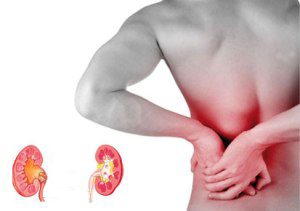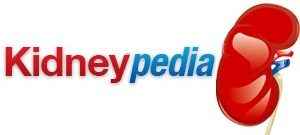
If pain arises in the lower back, is it kidney pain? In fact, most of the time it isn’t. Many people are surprised to learn that the kidneys are actually located fairly high in the torso, just beneath the ribcage. Also, the lower back is a complicated region of the body, including the spine, the digestive system, and many muscles, as well as the kidneys and urinary tract.
Much can go wrong with any of these factors and cause pain. When kidney pain does occur, it is a result of infection or injury to the kidneys or blockage of the urinary passages. Diagnostic procedures such as blood tests and medical imaging can help to identify exactly what is wrong. When a dull ache arises in the upper or middle back, accompanied by fever or (especially) by urinary symptoms, the likelihood rises that the kidneys are involved.
Kidney Stones
Despite the name, the pain from kidney stones (which is intense) isn’t kidney pain. As long as the stones remain in the kidneys, they are usually painless. The pain arises as the stones begin to move out of the kidneys, when they are large enough to obstruct the ureters.
Although the pain from kidney stones is not really (technically) kidney pain, it can be intense and certainly kidney stones that produce symptoms are a significant medical concern. The most common cause of kidney stones is dehydration and drinking plenty of water is a good preventative.
Infections
Urinary tract infections (UTI) normally do not begin in the kidneys. They start, typically, in the lower urinary tract: the bladder and the urethra. However, it is possible for a UTI to spread to the kidneys in a condition known as pyelonephritis or simply kidney infection.
A kidney infection is very serious. It can permanently damage the kidneys. It can also spread to the bloodstream and become a life-
Blood Clots
Another cause of kidney pain is clot formation either in the renal artery (the blood vessel carrying blood to the kidneys) or the renal vein (which carries blood away from the kidneys). A common cause of clot formation is atherosclerosis, which also carries other medical dangers especially cardiovascular disease. In addition to treating the kidney damage from the immediate blood clot, the overall condition will need
treatment and monitoring.
A clot forming in the renal vein is a condition called renal vein thrombosis. This may not arise due to atherosclerosis. A common cause of renal vein thrombosis is dehydration. It may also result from traumatic damage to the kidneys themselves. Other symptoms of renal vein thrombosis include blood in the urine or decreased urine volume.
Polycystic Kidney Disease
Polycystic kidney disease, a condition in which multiple cysts or non-
Kidney Cancer
Cancer of the kidney can certainly progress to the point where it causes kidney pain. As with any cancer, this is a serious and potentially life-
Treatment
Treatment for kidney pain depends on the cause. However, any disorder that produces kidney pain as a symptom should be considered serious and a cause for medical concern.
